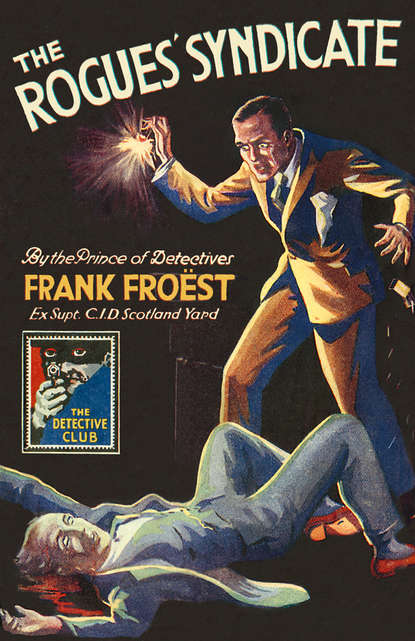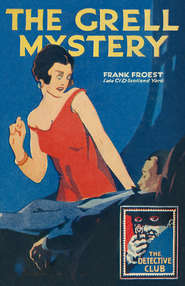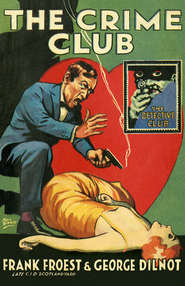По всем вопросам обращайтесь на: info@litportal.ru
(©) 2003-2024.
✖
The Rogues’ Syndicate: The Maelstrom
Автор
Год написания книги
2019
Настройки чтения
Размер шрифта
Высота строк
Поля
And drawing a bundle of papers from his breast-pocket, he sorted them till the envelope he needed lay at the top.
CHIEF DETECTIVE-INSPECTOR WEIR MENZIES,
New Scotland Yard, S.W.
Cautiously the man began to move across the hearthrug towards the telephone. Four shambling steps he took, and then something that had been hidden by the table tripped him, and he sprawled on all fours. He gave a little gasp of horror, and steadying himself on his knees, held his hands a foot in front of his face, gazing at them stupidly. They were wet—wet with blood, and the thing that had tripped him was the body of a man.
It is one thing to be brought in association at second-hand—so to speak—with a crime, as are doctors, journalists, and detectives, but quite another to be so closely identified with it as to be an actor in the drama. Hallett had seen violence and even death in his time, but never had cold horror so thrilled him as it did now. In ordinary conditions, with nerves previously unshaken, he would have been little more moved than a spectator at a play—perhaps even less so, for real life tragedies are rarely well stage-managed.
Circumstances, however, had conspired to bring home to him the last touch of terror. The sudden assault, the locked room, and now the dead man, had strung his nerves to a fine edge. He could have shrieked aloud.
He wiped his hand on his handkerchief, but the stain still remained. Carefully he stepped over the body, and made his way to the telephone. His imagination was beginning to work, and he recalled cases where perfectly innocent men had been the victims of circumstantial evidence that had convicted them of hideous crimes. The story of the cheques thrust upon him in the fog seemed to him ridiculously unconvincing. Had his mind been less overwrought, had he been able to take a calmer survey of the matter, he would probably never have given his own position a thought. He fingered the telephone-book clumsily, and his mind reverted to the coincidence that he should hold a letter of introduction to one of the senior detectives of Scotland Yard.
‘Queer that it should come in so handy,’ he grinned feebly; and then weakness overcame him.
He gave a number to the exchange, and hours seemed to elapse before he got on to Menzies. In a quick rush of words he made himself known to the detective, and recited the happenings of the evening. He was not to know that barely a dozen disconnected words had reached the detective. His strength was waning, and he wanted Menzies to know everything before he gave way. As he finished, the receiver dropped listlessly from his hand, and for the first time in his life Jimmy Hallett fainted.
At the other end of the wire Weir Menzies was left with one of those harassing little problems that he hated. It was an irregular hour—an hour when he had reckoned on being safely on his way home. For all the insistence of the voice at the telephone, it might be quite a trivial affair. Menzies did not like losing sleep for trivialities. People in trouble are apt to take distorted views of the importance of their difficulties. That is why private inquiry agencies flourish.
Menzies had once been asked to investigate a highly important West End robbery at the house of a duke. The duchess herself had demanded the services of ‘the ablest and most experienced detective possible’, and had refused to give details to anyone else. Menzies went—to discover that a pet Pomeranian had strayed.
‘Madam,’ he had remarked after a frigid five minutes, ‘at one period I should have been delighted to try to find your dog. I was then paid for such matters. I am now paid for other things. There are many men as competent as I for the investigation to which you attach such importance. I regret that it would be a breach of duty for me to undertake it. I am merely a detective, but the salary I am paid for the use of my time would be out of proportion to the result, even if successful. I must refer your Grace to the local police-station. Good-evening.’
Since then he had been very cautious of ambiguous messages. He thought of his well-aired bed, and sighed. He was almost tempted to turn over the affair to the local division of police to deal with the case, or leave it to the night staff of the Criminal Investigation Department. The fact that he had been appealed to by name ultimately swayed him.
In two minutes he had set in motion the machinery which would reveal the point from which the voice originated. It needed no complex reasoning, no swift flash of inspiration. He broke up a game of dominoes, and emerged with two men—one to extract from the Kensington directory a list of thoroughfares ending in ‘gardens’, and the names of persons who resided at the respective thirty-fours; and the other with a telephone directory to eliminate all those not on the telephone.
‘And get a move on,’ he added. ‘I don’t want to hang about all night. Ask Riddle to come up and ’phone ’em through to the local people as you check ’em off. Tell ’em they’ll oblige me by sending out as many spare men as they’ve got to ask at each address if anyone rang me up.’
He adjusted his coat with precision, lit a cigar, and sauntered over to the Underground station opposite. Barring accidents, the address would be ready for him by the time he reached Kensington.
His anticipation was not disappointed. One of the advantages which the Criminal Investigation Department has over the individual amateur detective, beloved by Magersfontein Road, is the co-operation at need of a practically unlimited number of trained men. True, the detective staff at Kensington had long since gone home, since there was no extraordinary business to detain them, but, in this case, a dozen ordinary constables served as well. Nine of them had returned when Menzies walked in. There was only one who interested him. He had reported that he could get no reply from Linstone Terrace Gardens.
‘Did you find who lives there?’ questioned the chief-inspector.
The reply was prompt.
‘Yes, sir. Old gentleman named Greye-Stratton. He lives alone. Had two servants until last week, when he sacked ’em both, because he said they had been bribed to poison him.’
‘Ah!’ Menzies nodded approval. ‘You’ve got your wits about you, my lad. Where did you get all this from?’
The constable flushed with pleasure. He was young enough in the force to appreciate a compliment from the veteran detective.
‘The servant next door, sir,’ he answered.
‘That will do. Thank you.’ Menzies rubbed his hands with satisfaction as he turned to the uniformed inspector by his side. ‘It begins to sound like a case,’ he muttered. All his petulance had gone. When it came to the point, the man was an enthusiast in his profession. ‘I’ll get you to come along with me, inspector. It sounds uncommonly like a case.’
CHAPTER III (#u2fd2121e-089e-54e3-ac29-908e751c2890)
THE eminent Tooting churchwarden, perched on the stalwart shoulders of his uniformed colleague, wriggled his way on to the roof of the porch with an agility that was justifiable neither to his years nor his weight. He was taking a certain amount of risk, if there were no serious emergency within the place, for even a chief detective-inspector may not break into a house without justification.
He worked for a while with a big clasp knife on the little landing window, with a skill that would have done credit to many of the professional practitioners who had passed through his hands, and at last threw up the sash and squeezed himself inside.
‘Wonder if I’m making a blamed fool of myself, after all?’ he muttered with some misgiving, as he struck a match and softly picked his way along the corridor.
He was peculiarly sensitive to ridicule, and he knew the chaff that would descend on his head if it leaked out that he had elaborately picked out and broken into a house empty for quite a plausible reason.
There would be no way of keeping the matter dark, for every incident of the night would have to be embodied in reports. Every detective in London is bound to keep an official diary of his work, however free a hand he is given in his methods.
He burned only one match to enable him to get his bearings. Noiselessly he descended the stairs into the hall, and his quick eye observed a splash of light across the floor. It came from under a doorway. He turned the handle and pushed. The door resisted.
‘Locked,’ he murmured, and knocked thunderously. ‘Hallo in there! Anyone about?’
Only the muffled reverberation of his own voice came back to him. Frowning, he strode to the doorway, slipped back the Yale lock, and admitted the uniformed man.
‘If I had nerves, Mr Hawksley, this place would give me the jumps,’ he observed. ‘There’s something wrong here, and I guess it’s in that room. See, there’s a light on.’
‘That’s queer,’ commented the other. ‘It could only just have been switched on. I didn’t notice it outside.’
‘Shutters,’ said Menzies. ‘Shutters and drawn curtains. Come on. I’m going to see what’s behind that door.’
There was no finesse about forcible entry this time. Half a dozen well directed kicks shattered the hasp of the lock and sent the door flying open. Menzies and his companion moved inside.
For a moment the blaze of the electric light dazzled them. Menzies shaded his eye with his hand. Then his glance fell from the overturned telephone down to the prostrate figure of Jimmie Hallett. He was across the room in an instant, and made swift examination of the prostrate man.
‘Knocked clean out of time,’ he diagnosed. ‘Help me get him on the couch. Hallo, there’s another of ’em.’ He had observed the body on the hearthrug.
He bent over the murdered man in close scrutiny, but without touching the corpse. His lips pursed into a whistle as he marked the bullet wound that showed among the grey locks at the back of the head. He was startled, but scarcely shocked.
He straightened himself up.
‘This looks a queer business altogether, Hawksley. You’d better get back to the station. Send up the divisional surgeon and ’phone through to the Yard. They’d better let Sir Hilary Thornton and Mr Foyle know. I shall need Congreve and a couple of men, and you’d better send for Carless and as many of his staff as can be reached quickly. They’ll know the district.’
The faculty of quick organisation is one of the prime qualities of a chief of detectives, and Menzies was at no loss. The first steps in the investigation of most great mysteries are automatic—the determination of the facts. It is a kind of circle from facts to possibilities, from possibilities to probabilities, and from probabilities to facts. But the original facts must be settled first, and for any person to fix them single-handed is an impossibility.
There are certain aspects that must be settled by specialists; there may be a thousand and one inquiries to make in rapid succession. Menzies had no idea of playing a lone hand.
For a couple of hours a steady stream of officials and others descended on the house, and Linstone Terrace Gardens became the centre of such police activity as it had never dreamed would affect its respectability and retirement.
Men worked from house to house, interviewing servants, masters, mistresses, gleaning such facts as could be obtained of the lonely, eccentric old man, his habits, his visitors, friends, and relations. Inside the house the divisional surgeon had attended to Hallett—‘No serious injury; may come round at any moment’—and once certain the other was dead waited till flash-light photographs of the room had been taken from various angles examining the body. Draughtsmen made plans to scale of the room and every article in it. A finger-print expert peered round searchingly, scattering black or grey powder on things which the murderer might have touched. In the topmost rooms, Congreve, Menzies’ right-hand man, had begun a hasty search of the house, that would become more minute the next day.
Menzies had occupied a morning-room at the back of the house, and was deep in consultation with Sir Hilary Thornton, the grizzled assistant-commissioner, and Heldon Foyle, the square-shouldered, well-groomed Superintendent of the Criminal Investigation Department. There was little likeness between the three men, unless it lay in a certain hint of humour in the eyes and a firmness of the mouth. A detective without a sense of humour is lost.
Now and again Menzies broke off the conversation to issue an order or receive a report. Thornton observed for the first time the characters in which he made a few notes on the back of an envelope.
‘I didn’t know you knew Greek, Menzies,’ he remarked.
The chief-inspector twiddled his pencil awkwardly.







